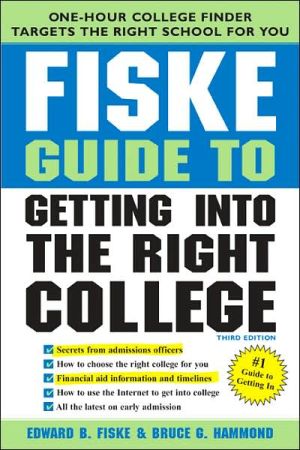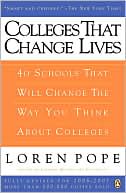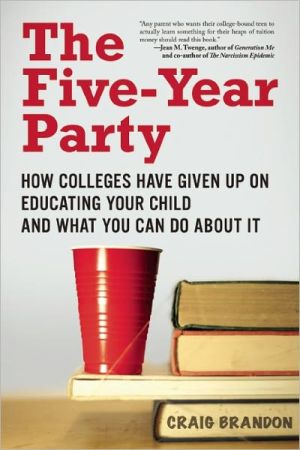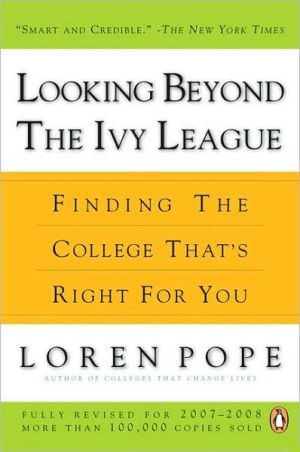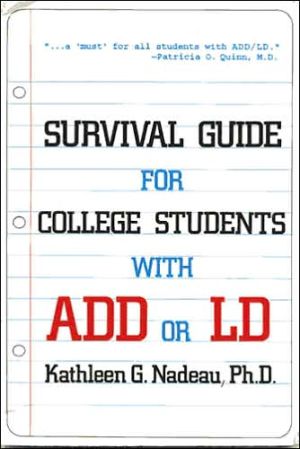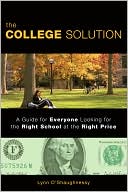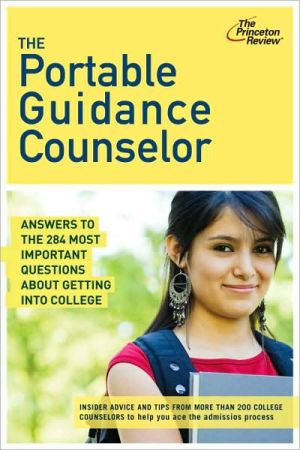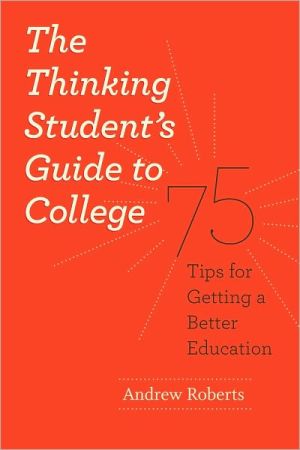Fiske Guide to Getting into the Right College, 3E
Find the college that's right for you!\ \ An A-Z of admissions secrets, The Fiske Guide to Getting into the Right College takes you behind the scenes of the college application process. The expert advice and tips in this book will help you get accepted at the schools of your choice. This clear, accessible guide takes students and their parents step-by-step through the admissions process.\ \ Learn:\ --How to choose the right college\ --How to get off a waiting list and get accepted\ --How to...
Search in google:
The #1 getting-into-college guide! Booknews Fiske was education editor for for 17 years; Hammond has edited several guides to colleges. Their guide for college-bound studentsand their familiesis intended to demystify the processes of identifying the right college, getting accepted, and paying for higher education. In addition to general information describing these processes, the text includes a 60-plus page list of colleges grouped according to type( e.g. elite, best bargains, best-kept secrets, top conservative, top nonconformist). Annotation c. Book News, Inc., Portland, OR (booknews.com)
From Part One The Search Begins\ (or, What to Do When You Don't Have a Clue)\ \ The college advising office in your high school can be a pretty intimidating place, especially on your first visit. An eerie silence pervades the room. As you cross the threshold and survey the scene, your eye catches the twelfth-grade boy who used to flick spitballs into your hair from the back of the bus when you were in middle school. He's still wearing the same flea-bitten Metallica T-shirt, but now his nose is buried in a college guide as he scribbles feverishly in a spiral notebook. On the other side of the room, the girl from down the street with the doting mother and the 4.0 grade point average is staring purposefully into a computer screen, clacking the keyboard every few seconds as she calls up a new file. Suddenly, you get a sinking feeling that she and all the other kids in the room know exactly what they're doing. You're the only one who doesn't have a clue. Of course, you could always ask Mrs. Stonebreaker for help. That is, if you don't mind the familiar glasses-on-the-end-of-the-nose routine and the icy stare that says you've just asked the stupidest question of her thirty-four-year career. You want to beat a hasty retreat and come back later-much later.\ \ It's no wonder that beginning college applicants often get the strong urge to run away and hide. Talk about an intimidating situation! Many students have barely gotten comfortable in high school before the college search looms ominously on the horizon. Rumblings about "selective colleges" and "the job market" begin to pop up in dinner conversations and guidance office bulletin boards. Friends who used to be party animalssuddenly begin to hit the books and talk about "getting the grades for college." Relatives you haven't seen in years marvel about how much you've grown-and then want to know all about your career plans.\ \ As if those storm clouds weren't threatening enough, there is the little matter of finding one college out of about twenty-two hundred four-year schools in the nation. They come in more flavors than Baskin-Robbins or Ben and Jerry ever dreamed of making-large, small, middle-sized, rural, urban, and a thousand permutations. If colleges were ice cream, a student could sample four or five flavors and make a choice. Unfortunately, college applicants must get it right the first time or go through the same agony again when they transfer. How can you figure out what sort of college is right for you?\ \ One place you won't find the answer is your mailbox, which, if you have checked a certain oval on your PSAT exam, has become a direct pipeline to the propaganda factories of colleges coast to coast. Though the deluge of college mail can be highly entertaining, every school from Harvard to Ho Hum U. advertises a similar bill of goods. If you were confused before, try figuring out the difference between two colleges by reading the glossy viewbooks. The scenes in their pages are always the same: eager hordes of racially diverse undergraduates thinking deep thoughts or frolicking in a perpetual spring against a backdrop of white columns and grassy lawns. Let's see now...College X offers "academic excellence" and "rich diversity." On the other hand, College Y offers "rich diversity" and "academic excellence." Still can't tell the difference?\ \ Meanwhile, all the adults in your life (and a few you've never seen before) offer their two cents about where you should go to school. From your grandfather, you get the latest updates on colleges and the job market from U.S. News & World Report. Mom says that you can choose any school you want-as long as you stay within fifty miles of home. Even your great uncle Pete, whom you barely know, takes you under his wing and says he has the perfect college for you based on his wonderful experience in the early 1950s.\ \ If you're confused by conflicting advice, if you're put off by college propaganda, if you're eager to get started but don't know where to begin, this book is your ticket to a successful college search. We'll take you on a guided tour of the entire process: how to find the right college for you, how to get in, and how to pay for it. Along the way, we'll help you focus your thoughts and figure out what you're really looking for. We'll tell you how to cut through the college search nonsense and then give you insider sketches of hundreds of colleges in dozens of categories. We'll reveal the secrets of the highly selective admissions game and how you can play it to win. And finally, we'll delve into the shadowy world of college financial aid-how to get your hands on it and how your need for it may affect your chances for admission.\ \ Before we begin plotting strategy, let's step back for a minute and remind ourselves of what the college search is all about. Amid all the anxiety about getting in, it helps to keep the big picture in mind.\ \ Why College?\ That may seem like a stupid question, but there is more to the answer than meets the eye. Practicality says that people go to college to get a good job after graduation and there is plenty of research to show that college is a sound economic investment. On average, college graduates can expect to earn more than twice as much as those with a high school diploma over a working lifetime and the gap is widening.\ \ There are two schools of thought about how to get the most out of your college experience. Many educators stress the value of exposure to a broad spectrum of human knowledge. The phrase "liberal arts education" connotes learning that "liberates" the mind to think new thoughts. A liberal arts education is an introduction to the great events and ideas of the past, as well as the most recent discoveries of today. It can include history, art, astronomy, zoology, and everything in between. It doesn't prepare you for any particular job, but instead equips you with the basic skills-reading, writing, thinking-to meet any challenge that comes down the pike. In other words, it means "learning to learn."\ \ The alternative to a liberal arts education is to use college to prepare for a particular career. This approach places less emphasis on a well-rounded general education than the acquisition of knowledge related to a particular job or subset of jobs. Some careers, such as engineering and architecture, require concentrated training beginning in the freshman year that leaves little time for smelling the roses. Facing the uncertainties of the job market, nervous undergraduates often feel strong pressure to "major in something practical."\ \ In addition to its economic function, college attendance also provides a high school graduate with the first public measure of his or her academic and personal success. Admission to a "name" college is like getting an A in growing up and comes with the presumption of future success to follow. The ego of anyone-especially a seventeen-year-old-is fragile. Who wouldn't want a stamp of approval from one of the world's most respected and recognized institutions?\ \ With all the practical reasons to attend, let us not forget that college is also a once-in-a-lifetime experience. You can test your limits, try new things, and make some incredibly stupid mistakes-all without the responsibility of having to make a living. The friendships you form will last a lifetime and so, too, will the memories. Decades from now, when you're rocking away the retirement years on the front porch, college will probably rank high on the list of things that made life worth living.\
Part 1Finding the Right Collegeix1.The Search Begins (or, What to Do When You Don't Have a Clue)12.Sizing Yourself Up93.The College Universe194.Getting a Jump Start295.Cutting through the Propaganda376.The One-Hour College Finder457.Where to Learn More111Part 2Getting In1178.Inside the Admissions Process1199.Shaping Your Record12910.How Important Are Standardized Tests?13711.How to Prepare for Standardized Tests14512.The Early Decision Dilemma15513.How to Size Up a Campus16114.Surviving the Interview16715.Getting Good Recommendations17316.Filing Your Applications17717.Scoring Points with the Essay185Part 3Paying the Bill19118.The New Financial Aid Game19319.Dave's World: A Financial Aid Timeline215Part 4A Time to Reflect22520.Fat Letters and Thin22721.Some Thoughts for Parents231Appendix IWhat to Do When235Appendix IIGlossary239Acknowledgments243One-Hour College Finder Index245General Index255About the Authors259
\ From Barnes & NobleYou don't have to go broke to go to college. Whether you're a parent or a student, Fiske's invaluable book will give you the information you need, from finding the right college to applying for financial aid.\ \ \ \ \ BooknewsFiske was education editor for for 17 years; Hammond has edited several guides to colleges. Their guide for college-bound studentsand their familiesis intended to demystify the processes of identifying the right college, getting accepted, and paying for higher education. In addition to general information describing these processes, the text includes a 60-plus page list of colleges grouped according to type( e.g. elite, best bargains, best-kept secrets, top conservative, top nonconformist). Annotation c. Book News, Inc., Portland, OR (booknews.com)\ \
